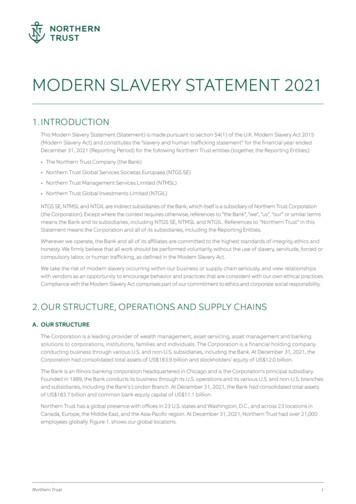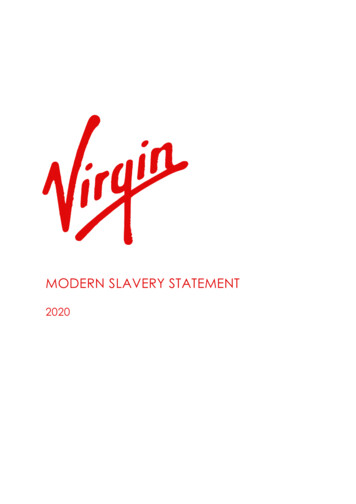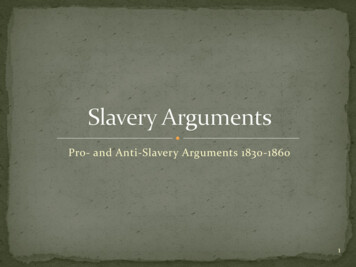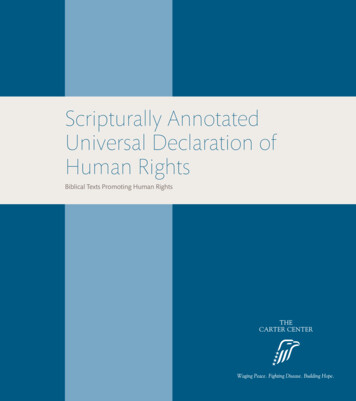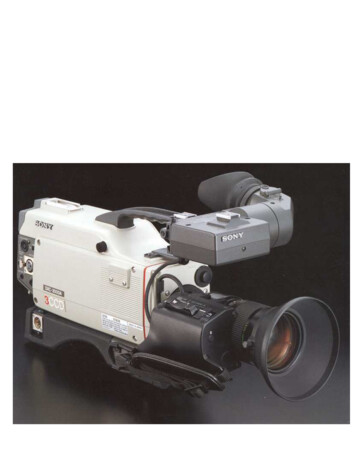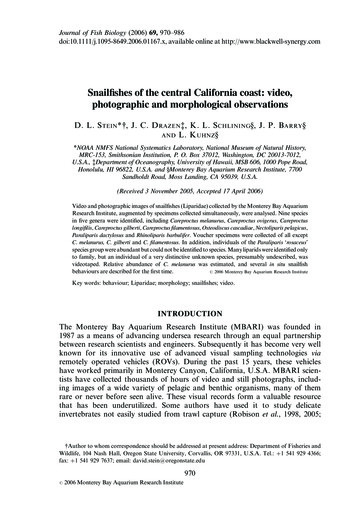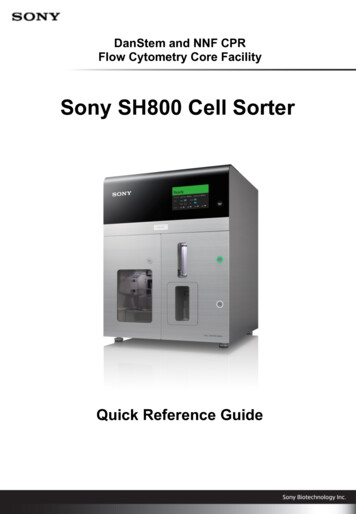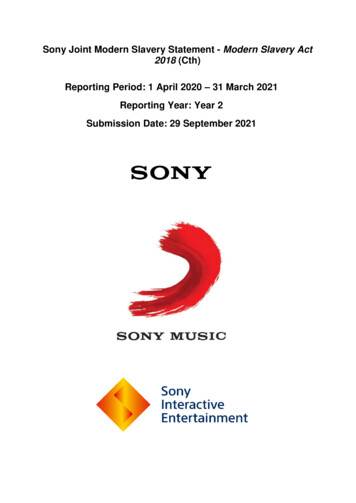
Transcription
Sony Joint Modern Slavery Statement - Modern Slavery Act2018 (Cth)Reporting Period: 1 April 2020 – 31 March 2021Reporting Year: Year 2Submission Date: 29 September 2021
Sony Joint Modern Slavery Statement - Modern Slavery Act 2018 (Cth)Summary: Addressing the Mandatory Criteria of the Modern Slavery Act 2018 (Cth)Section ofActObligationWhere the obligation is addressedin the Joint Statement16(1)(a)Identify the reporting entitiesPages 2-316(1)(b)Structure, Operations and Supply ChainsPages 4-816(1)(c)Risks of modern slavery practices in theoperations and supply chains of thereporting entities and any entities thereporting entity owns or controlsPages 8-10Actions taken to assess and addressmodern slavery and human traffickingrisks, including due diligence andremediation processesPages 10-16How Sony assesses the effectiveness of itsactions to assess and address modernslavery risksPage 1616(1)(f)Sony’s consultation processPage 1716(1)(g)Other relevant informationPages 17-1816(1)(d)16(1)(e)14(2)(d)(i)Approval and signing of a joint statementPage 19Mandatory Criterion 1 – Identify the reporting entitiesThis joint modern slavery statement (“Joint Statement”) meets the requirements for approval andsignature set out in section 14 of the Commonwealth Modern Slavery Act 2018 (Cth) (the “AustralianModern Slavery Act”).This Joint Statement covers all Sony companies operating and carrying out business in Australia,who are required by the Australian Modern Slavery Act to publish a modern slavery statement(collectively referred to in this Joint Statement as “Australian Sony reporting entities”, “we” or“us”). The list of Australian Sony reporting entities covered by this Joint Statement as of 31 March2021 is available in the Annex.2
This Joint Statement covers the reporting period between 1 April 2020 to 31 March 2021 andaddresses each of the mandatory criteria for content set out in section 16 of the Australian ModernSlavery Act.Although not all Sony Group companies (“Sony”) are subject to the Australian Modern Slavery Act,all Sony companies throughout the World (including the Australian Sony reporting entities) arerequired to comply with applicable global Sony policies and procedures, so we make references toactions taken at a global level in this Joint Statement together with additional steps the AustralianSony reporting entities have taken in the relevant reporting period.The Australian Sony reporting entities note the supporting guidance provided by the AustralianGovernment set out in the Commonwealth Modern Slavery Act 2018 - Guidance for ReportingEntities (“Australian Government Guidance”) together with the supplementary guidancesubsequently released by the Australian Government. The Australian Sony reporting entities haveused the Australian Government Guidance to help prepare this Joint Statement and to more generallyinform and guide the steps we are taking and our approach to compliance with the Australian ModernSlavery Act.Our Human Rights CommitmentSlavery and human trafficking can occur in many forms, such as forced labor, child labor, domesticservitude, sex trafficking, and related forms of workplace abuse. In this Joint Statement, we use theterms “slavery” and “human trafficking” or “modern slavery” to include all forms of slavery,servitude and forced or compulsory labor, and human trafficking in a manner consistent with thedefinition of “modern slavery” in the Australian Modern Slavery Act.Globally, Sony is committed to maintaining and improving systems and processes to help identifyand address risks of human rights violations related to our business operations and supply chainsthroughout the world. At a global level, we have invested significant resources and have collaboratedwith stakeholders, suppliers and industry associations to develop and implement programs designedto prevent slavery and human trafficking in our business operations and supply chains, particularlyin our electronics manufacturing supply chain, which, as noted below, is an area at higher risk ofslavery and human trafficking.Since the introduction of the Australian Modern Slavery Act, the Australian Sony reporting entitieshave also invested significant resources to understand the requirements of the Australian ModernSlavery Act and the expectations of the Australian Government as set out in the AustralianGovernment Guidance, as well as considering further guidance issued by the Australian Government.This body of work includes working closely with “Global HQ” stakeholders in Legal, Complianceand CSR at Sony Group Corporation on an ongoing basis to develop and refine our approach to3
addressing this important and complex human rights issue.Sony’s global, prioritised, risk-based approach aligns with the approach taken by the AustralianGovernment, however, the Australian Sony reporting entities have also taken additional steps andmeasures where required as set out in this Joint Statement.Mandatory Criterion 2 – Our Structure, Operations and Supply ChainsStructureAll of the Australian Sony reporting entities form part of the Sony group. Sony Group Corporation(Organisation number 134 059 582) (“Sony Group Corporation” or “Global HQ”), incorporatedin Japan, is the ultimate parent company for all of the Australian Sony reporting entities. Sony Australia Limited (ACN 001 215 354) is an Australian public company, limited byshares. It has approximately 197 employees and its registered office is 165 Walker Street,North Sydney NSW 2060. In terms of its corporate structure, it does not control any otherentities and its Dutch holding company (Sony Overseas Holding BV) owns 100% of the issuedshares in Sony Australia Limited. Sony Music Entertainment Australia Pty Ltd (ACN 107 133 184) is an Australianproprietary company, limited by shares. It has approximately 135 employees and its registeredoffice is 11-19 Hargrave St Darlinghurst NSW 2010. In terms of its corporate structure, itsimmediate parent entity is SBME Holdings (Australia) Pty Limited. It owns and controls somelocal Australian music businesses. SBME Holdings (Australia) Pty Ltd (ACN 107 132 329) is an Australian proprietarycompany, limited by shares. In terms of its corporate structure, its immediate parent entity isSony Music Entertainment, incorporated in the United States of America and it owns orcontrols BMG Australia Pty Limited and Sony Music Entertainment Australia Pty Ltd. Sony Interactive Entertainment Australia Pty Limited (ACN 077 583 183) is an Australianproprietary company, limited by shares. It has approximately 61 employees with registeredoffice at 64 – 76 Kippax Street, Surry Hills NSW 2010. In terms of its corporate structure, itsparent company is Sony Interactive Entertainment Europe Ltd; it is a wholly owned subsidiaryof Sony Interactive Entertainment Europe Ltd and it does not control any other entities. Sony Interactive Entertainment Network Europe Ltd (Company number 06020283) is aprivate company, limited by shares, with a registered office in the UK. In terms of its corporate4
structure, its parent company is Sony Interactive Entertainment Europe Ltd; it is a whollyowned subsidiary of Sony Interactive Entertainment Europe Ltd and it does not control anyother entities.Operations.To understand the specific operations of the Australian Sony reporting entities, it is useful first tounderstand how Sony operates at the global level. Globally, Sony is engaged in the development,design, manufacture, and sale of various kinds of electronic equipment, instruments and devices forconsumer, professional and industrial markets such as network services, game hardware andsoftware, televisions, audio and video recorders and players, still and video cameras, mobile phones,and image sensors (collectively, our “electronics products”). Globally, there are 12 Sony-operatedmanufacturing sites for our electronics products, which are located in Japan, China, South Korea,Thailand, Malaysia, and UK. Sony global affiliates also contracts with third parties to manufacturecertain electronics products on Sony’s behalf.In addition to electronics, Sony is engaged in the development, production, manufacture, anddistribution of recorded music and the management and licensing of the words and music of songsas well as the production and distribution of animation titles, including game applications based onanimation titles. Sony is also engaged in the production, acquisition and distribution of motionpictures and television programming and the operation of television and digital networks. Further,Sony is also engaged in various financial services businesses, including life and non-life insuranceoperations through its Japanese insurance subsidiaries and banking operations through a Japaneseinternet-based banking subsidiary.The Australian Sony reporting entities specifically undertake the following functions, activities andoperations: Sony Australia Limited (ACN 001 215 354)- Sony Australia Limited is a local sales and marketing company in Australia forelectronics manufactured by Sony. We do not manufacture any electronics. Our corebusiness is divided into consumer products and professional products and solutions. SonyAustralia Limited’s key consumer products are televisions, home theatre and solutions,Blu-ray disc and DVD players, headphones and earphones, MP3 players, wirelessspeakers, cameras, video cameras and memory cards. These products are sold through arange of retail partners across Australia and also directly by Sony Australia Limitedthrough our online store (https://store.sony.com.au/) and retail stores located in CastleHill, Chatswood and Parramatta (Sydney).5
- Sony Australia Limited also provides to the Australian market a range of professionalproducts and solutions for the broadcast and production, sports, entertainment, education,corporate and healthcare sectors. Professional products include studio and broadcastcameras, digital cinema cameras, camcorders, professional monitors and projectors,optical disc archiving, and imaging cameras and monitors.- Our professional solutions also include integrated solutions for outdoor broadcast vans(OBVs) and sports tracking technologies through our Hawk-Eye business acrossAustralia. Sony Music Entertainment Australia Pty Ltd (ACN 107 133 184)- Sony Music Entertainment Australia Pty Ltd is the Australian affiliate of Sony MusicEntertainment.- The principal continuing activities of Sony Music Entertainment Australia Pty Ltd arethe sale and licensing of pre-recorded music, compact discs, records, DVDs andassociated merchandise and the sale of music via digital channels. In addition, thecompany is involved in sponsorships and endorsements, concert promotion and artistmanagement.- The company has played a pioneering role in music history and nurtured some of music’smost iconic artists and produced some of the most influential recordings of all time. Thecompany supports a diverse roster of superstars, developing and independent artists andvisionary creators, with a local artist roster consisting of over 70 Australian artists.- Sony Music Entertainment Australia Pty Ltd is also involved in the operations of the localAustralian music businesses which it either owns or controls. SBME Holdings (Australia) Pty Ltd (ACN 107 132 329)- SBME Holdings (Australia) Pty Ltd is the holding company for Sony MusicEntertainment Australia Pty Ltd and does not undertake any operations. Sony Interactive Entertainment Australia Pty Limited (ACN 077 583 183)- Sony Interactive Entertainment Australia Pty Limited is a sales and marketing companyand appointed local distributor for electronics manufactured by Sony InteractiveEntertainment Europe Limited (and associated subsidiaries). We do not manufacture anyproducts ourselves.- Our core business is consumer products, including products marketed under thePlayStation brand.- Our key consumer products are gaming consoles, videogames and associated peripherals,6
and accessories.- These products are sold through a range of retail partners throughout Australia. Sony Interactive Entertainment Network Europe Ltd (Company number 06020283)- Sony Interactive Entertainment Network Europe Ltd operates the PlayStation online storeand sells digital games from that platform to Australian consumers.Supply ChainsThe supply chains across the different Australian Sony reporting entities are complex and varied. A high-levelsummary of our supply chain structure is set out below.i. Supply chains in relation to core Sony productsWe acquire our products from our Sony global affiliates who form part of our supply chain for core productssuch as electronics. Our global affiliates procure materials and component parts for Sony’s electronicsproducts from suppliers located throughout the world including China, Japan, Asia-Pacific (India,South Korea, Oceania), Europe (UK, France, Germany, Russia, Spain, Sweden), and other tps://www.sony.com/en/SonyInfo/csr report/sourcing/ and our Sustainability Report 2021 formore details available at https://www.sony.com/en/SonyInfo/csr report/.Specifically, Sony Australia Limited imports electronics from Sony Corporation, while SonyInteractive Entertainment Australia Pty Limited acquires electronics in connection with thePlayStation brand (such as gaming consoles and accessories) from Sony Interactive EntertainmentEurope Limited. These supply arrangements are long term and secure, given they are intra-grouparrangements.Sony Music Entertainment Australia Pty Limited acquires the rights to audio and audio visualrecordings through entering into recording agreements with music recording artists, where SonyMusic Entertainment Australia Pty Limited acquires ownership in the recordings, or by entering intolicence or distribution agreements with such artists, where the artist retains ownership and SonyMusic Entertainment Australia Pty Limited acquires more limited rights for a fixed period. SonyMusic Entertainment Australia Pty Limited also obtains the rights to audio and audio visualrecordings of international music recording artists through licence arrangements with othercompanies in the Sony Music Entertainment corporate group outside of Australia. Sony MusicEntertainment Australia Pty Limited releases and markets these recordings in Australia via physicalformats such as CD and vinyl and via digital formats such as streaming services and downloads.ii. Supply chains for other operations7
To support the sale and marketing operations and other activities, the Australian Sony reportingentities’ supply chain also includes the following: logistics services (end to end transportation of Sony products to end consumers, includingwarehousing); sales and marketing (advertising, promotions, merchandise, public relations, social media, retaildisplays); professional services (legal, accounting and tax advice); insurance; administrative support (such as outsourced accounts receivable/payable functions); information technology (IT infrastructure, IT consulting, IT goods and services procurement);and facilities management (services for cleaning, repairs and maintenance and day to day businessoperations).Generally speaking our suppliers for the above are based locally in Australia. However: some back-end support services, such as IT services, are provided by our global affiliates; and a small number of our suppliers are located outside Australia, for example, some of Sony MusicEntertainment Australia Pty Limited’s merchandise manufacturers are located off-shore(including China), Sony Australia Limited’s call center operator is located in the Philippines andSony Interactive Entertainment Australia Pty Limited engages suppliers located in the UnitedKingdom and the Philippines.Mandatory Criterion 3 – Describe the risks of modern slavery practices in the operations andsupply chains of the reporting entities and any entities the reporting entity owns or controlsGlobally, using a risk-based approach, Sony has prioritised its group wide efforts to mitigate humanrights risks in our electronics manufacturing supply chains.In our last reporting period:GloballySony engaged Business for Social Responsibility (“BSR”), an independent, non-profit, globalorganisation devoted to building a just and sustainable world, to evaluate risks of slavery and humantrafficking in our business operations and related supply chains. From that risk assessment, andfrom information derived from our processes and controls, we understand that our electronicsmanufacturing supply chain is at higher risk for potential human rights abuses than Sony company8
business operations, or the supply chains of our non-electronics business segments.LocallySony Australia Limited completed a preliminary scoping exercise to identify key areas of potentialmodern slavery risk in relation to its specific operations and supply chain. The following key potentialrisks in Sony Australia Limited’s operations and supply chain were identified:Sector and industry risksConsistent with Sony’s global approach we identifiedelectronics as being a higher risk sector and industry. We alsoidentified fashion in relation to our merchandise and cleaningin relation to our offices as sectors known to have a higher riskof modern slavery as outlined in the Australian GovernmentGuidance.Product and services risksAgain, we identified electronic products, which have beenidentified by the Global Slavery Index 2018 as the products atthe highest risk of modern slavery. We recognise that cottonused in merchandise represents a potentially high risk.Additionally, services such as cleaning are recognised aspotential high-risk services.Geographic risksWe recognise that some countries may have potentially higherrisks of modern slavery. The Global Slavery Index 2018indicates that electronics and fashion in particular sourcedfrom certain Asian countries present higher risks of beingimplicated in modern slavery.Having identified the above key potential risks in supply chains and operations, Sony AustraliaLimited identified for the purpose of key initiatives in the current reporting period: (1) key supplierswho would receive supplier surveys as part of Year 2 initiatives, and (2) which Sony AustraliaLimited employees would receive priority training which covered modern slavery risks and modernslavery compliance generally.During this reporting period, as a result of the steps taken as set out in Mandatory Criterion 4, Sonyand Sony Australia Limited identified the following additional matters in respect of identifyingmodern slavery risks in our operations and supply chains:Globally9
Sony identified the following as a result of the surveys conducted as set out in Mandatory Criterion4: Our supplier plants are in substantial compliance with the Supply Chain Code (as defined below). We identified some areas of minor non-conformance such as excessive working hours. Neither forced labour or child labour were identified.LocallySony Australia Limited identified the following additional detail concerning risks of modern slaveryin respect of its key suppliers who provide merchandising and associated products and services toSony Australia Limited: some suppliers do not have sufficient policies imposing standards on their own suppliers formodern slavery related risks such as those around child labour, forced and bonded labour, harshand inhumane treatment, discrimination, or whistleblowing; and some suppliers do not have sufficient contractual obligations with their own suppliers for modernslavery related risks such as those around child labour, forced and bonded labour, harsh andinhumane treatment, discrimination, or whistleblowing.Mandatory Criterion 4 – Actions taken to assess and address modern slavery and humantrafficking risks, including due diligence and remediation processesA global approachGlobally, Sony employs rigorous hiring procedures and has implemented robust employmentpolicies and other controls to mitigate the risk of slavery and human trafficking in our own businessoperations. Sony Group Code of Conduct. Our commitment to human rights is set out in the Sony GroupCode of Conduct, which is applicable to all Sony directors, officers, employees and relevantthird-party staff (the “Code of Conduct”). The Code of Conduct is available athttps://www.sony.net/code/. It has been translated into 23 languages and has beencommunicated to all Sony personnel. Our Code of Conduct reflects ethical principles set outin various global guidelines including the following guidelines:-Organisation for Economic Co-operation and Development (OECD) Guidelinesfor Multinational Enterprises10
-The United Nations Global Compact-The United Nations Universal Declaration of Human Rights-The Guiding Principles on Business and Human Rights-Sustainable Development Goals (SDGs)The Code of Conduct prohibits any form of forced, involuntary or child labor in our operations,requires all Sony companies to adopt sound labor and employment practices and requires all Sonycompanies to treat their employees in accordance with applicable laws. Each Sony company musttake appropriate steps to assure compliance with the Code of Conduct, including establishingappropriate disciplinary procedures for violations of the Code of Conduct which may includetermination of employment.In addition, in accordance with the Code of Conduct, all Sony suppliers and contractors are expectedto adhere to Sony’s ethical values and comply with Sony policies concerning compliance with laws,respect for human rights and fair labor and employment practices.Due diligence.i. Identifying and assessing actual and potential human rights impacts.Self-assessments. Assessments and audits are an integral part of our overall supply chainmanagement process. Each year, all of Sony’s own electronics manufacturing sites conduct a selfassessment utilizing the Responsible Business Alliance (“RBA”) Self-Assessment Questionnaire(“RBA Questionnaire”) to monitor adherence to the Code of Conduct and the Sony Supply ChainCode of Conduct (the “Supply Chain Code”). Sony internal procedures require adherence to thestandards of these Codes and implementation of an improvement plan in the event of any areas of noncompliance. The RBA Questionnaire was completed by all Sony manufacturing sites for fiscal year2020. The results of the RBA Questionnaire are reviewed and analysed internally by Sony. All Sonymanufacturing sites were deemed to be low risk based on the results of this assessment. There wereno high-risk sites identified, and no areas of serious concern were identified.Assessment of Labor Conditions for Foreign Workers Employed at Manufacturing Sites.In response to increasing concerns over labor conditions of migrant workers, our global affiliatesoperating in Japan conduct annual assessments to determine which manufacturing sites have thehighest risk of directly or indirectly engaging foreign workers. These assessments identified severalmanufacturing sites in Japan where our on-site business partners employ foreign workers. Sonyasked these business partners to survey their technical intern trainees in particular among foreignworkers, to confirm that appropriate hiring processes were used to engage such workers at thesesites. In fiscal year 2020, Sony continued to conduct document assessments to determine higherrisk sites and interviewed on-site subcontractors at these sites to verify the propriety of their hiring11
processes and confirm that technical intern trainees were provided proper working conditions inaccordance with the labor standards set out in the Supply Chain Code.Supply Chain Assessments and AuditsAs set out below (“Contract Terms”), all new and existing suppliers are required to comply with theSupply Chain Code. Assessments and audits are also an integral part of our overall supply chainmanagement process. New suppliers: Our global affiliates conduct an evaluation of all new suppliers and theirmanufacturing facilities to determine their risk level based on factors such as the country andregion in which they are located, size of business, industry, and type of business. If our globalaffiliates do not deal directly with the manufacturing facility, the evaluations are conductedthrough the trading company or the manufacturer that Sony does business with. Suppliers andtheir plants in certain countries and regions and/or meeting certain criterion are required toconduct a CSR self-assessment using questionnaires from the RBA. CSR self-assessmentsevaluate compliance with the Supply Chain Code, in particular, items related to forced laboramong foreign, migrant and immigrant workers, which has become a serious issue worldwide.If a supplier is suspected to be in violation of the Supply Chain Code, an on-site visit isconducted and employees and managers are interviewed in person to verify the actualmanagement situation. Sony issues improvement instructions if needed, verifies theimprovement results, and assesses to start business dealings. Existing suppliers: In fiscal year 2020, our global affiliates conducted document-basedassessments of existing supplier plants located in areas other than Japan, focusing on laborissues. Assessments and interviews regarding labor, health and safety, and supply chainmanagement were also conducted during on-site visits at supplier plants in Japan. Assessment Results for new and existing suppliers: Collectively, in fiscal year 2020, our globalaffiliates conducted a total of 564 document-based assessments for new and existing supplierplants, and also conducted on-site assessments and interviews at 6 plants. The results of theseassessments were as follows:- The document-based assessments found no serious concerns at any plant.- The document-based assessments identified 86 plants with minor concerns such as excessiveworking hours. Sony issued instructions to suppliers that have concerns and monitors theirremedial actions.- Subsequent on-site interviews and assessments showed that these plants are now incompliance with the standards set out in the Supply Chain Code. See more details of the12
examples in page 106 in our Sustainabilityhttps://www.sony.com/en/SonyInfo/csr report/. Report2021availableatMedia and NGO reports. In addition to information derived from our assessments and internalcontrols, Sony reviews media and NGO reports to help determine Sony’s highest-risk suppliers.If the reports indicate possible violations of the Supply Chain Code, Sony cooperates with thesupplier in question to confirm the facts of the case expeditiously and objectively. Specifically,Sony may request a third-party RBA audit of the supplier’s manufacturing site.In addition to the global efforts, the Australian Sony reporting entities have developed riskassessment surveys consistent with the Australian Government Guidance to apply to specificpotentially higher risk suppliers. As part of that process risk assessment surveys were sent by SonyAustralia Limited to those suppliers deemed highest risk by Sony Australia Limited. The AustralianSony reporting entities will continue to assess suppliers and send these surveys, ultimately educatingsuch suppliers on Sony’s global requirements and expectations. We will also consider media andNGO reports, the Australian Government Guidance and global policies and procedures in structuringour supplier risk assessment surveys. The current status on the roll out of these supplier surveys tosuppliers deemed highest risk is as follows:Australian Sonyreporting entityfunction andactivityAustralian Sonyreporting entitiesConsumerelectronic productsand professionalelectronic productsand solutionsSony Australia LimitedSale and licensing Sony MusicEntertainment Australiaof musicPty LtdSuppliersurveysissuedResponsesreceivedSupplier area65Merchandisingand associatedgoods andservicesNotcommencedyetNotcommencedyetNot applicableNotcommencedyetNotcommencedyetNot applicableSBME Holdings(Australia) Pty LtdGaming consoles,videogames andassociatedperipherals, andaccessories.Sony InteractiveEntertainment AustraliaPty LimitedSony InteractiveEntertainment NetworkEurope Limited13
ii. Integrating our findings across the group and taking appropriate action to address impacts.Supplier Compliance Procedures and Adherence to Our ValuesSupply Chain Code. Our global affiliates are committed to working with Sony’s suppliers and otherstakeholders to better understand potential areas of risk and increase transparency. Sony seeks to useits influence to help mitigate any negative impacts identified. Sony is a founding member of theRBA, a non-profit coalition comprising electronics, retail, automotive and toy companies committedto supporting the rights and well-being of workers and communities affected by the globalelectronics supply chain and has adopted the Supply Chain Code for Sony’s electronics productssuppliers. The Supply Chain Code, which incorporates the RBA Code of Conduct, establishesstandards designed to, among other things, ensure that human rights of workers are upheld and thatworkers are treated with respect and dignity by suppliers. In particular, the Supply Chain Codeprohibits forced, bonded or indentured labor, involuntary prison labor, slavery and tps://www.sony.com/en/SonyInfo/csr report/sourcing/.The Supply Chain Code is aligned with the UN Guiding Principles on Business and Human Rights,the ILO Declaration on Fundamental Principles and Rights at Work and the UN Declaration ofHuman Rights.Contract Terms. Compliance with the Supply Chain Code is included in contracts with directsuppliers signed when Sony begins doing business with the supplier. Suppliers are kept informedof changes to the Supply Chain Code and receive updated documents. To further ensure thatsuppliers are taking action to comply with the Supply Chain Code, Sony regularly reminds suppliersof their
Sony is also engaged in various financial services businesses, including life and non-life insurance operations through its Japanese insurance subsidiaries and banking operations through a Japanese internet-based banking subsidiary. The Australian Sony reporting entities specifically undertake the following functions, activities and operations:

